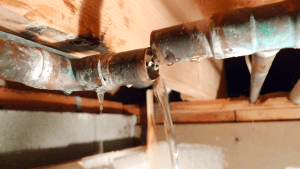Guide To Water Leakage Discovery In The House
Guide To Water Leakage Discovery In The House
Blog Article
Are you currently trying to find suggestions concerning Finding hidden leaks?

Early detection of dripping water lines can reduce a possible disaster. Some small water leakages might not be visible.
1. Examine the Water Meter
Checking it is a surefire way that helps you discover leakages. If it relocates, that indicates a fast-moving leak. This means you may have a slow-moving leakage that might also be underground.
2. Examine Water Consumption
Examine your water bills as well as track your water consumption. As the one paying it, you ought to see if there are any kind of discrepancies. If you detect sudden changes, regardless of your intake coinciding, it means that you have leaks in your plumbing system. Remember, your water bill need to drop under the very same range monthly. An unexpected spike in your bill indicates a fast-moving leakage.
Meanwhile, a stable increase every month, despite having the very same habits, shows you have a sluggish leakage that's likewise slowly intensifying. Call a plumber to thoroughly inspect your residential or commercial property, particularly if you feel a warm location on your flooring with piping beneath.
3. Do a Food Coloring Examination
When it involves water intake, 30% comes from bathrooms. Test to see if they are running properly. Decline specks of food color in the storage tank and wait 10 mins. There's a leakage in between the container and dish if the shade somehow infiltrates your bowl during that time without flushing.
4. Asses Exterior Lines
Don't forget to inspect your exterior water lines also. Should water leak out of the connection, you have a loosened rubber gasket. One small leakage can waste heaps of water and also spike your water bill.
5. Check as well as Assess the Scenario
Property owners need to make it a routine to examine under the sink counters and also also inside cabinets for any kind of bad odor or mold development. These 2 red flags indicate a leakage so timely attention is required. Doing regular assessments, also bi-annually, can save you from a major problem.
More importantly, if you know your residence is currently old, maintain a watchful eye on your heating units, hoses, pipes etc. Check for discolorations and weakening as most pipelines as well as devices have a life expectancy. They will also naturally weaken because of damage. If you presume leaking water lines in your plumbing system, don't await it to rise. Call an expert plumber right away so you don't wind up with a terrible mess in your home.
Early detection of leaking water lines can alleviate a potential disaster. Some tiny water leakages may not be visible. Examining it is a proven means that helps you uncover leaks. One small leakage can lose bunches of water and also surge your water expense.
If you think dripping water lines in your plumbing system, do not wait for it to escalate.
5 Signs that Your Home Has a Hidden Leak
Your water bill is unusually high without explanation
Generally, your water bill tends to stay consistent throughout the year as long as the same number of people live in your household year round. The bill might be higher during certain times of the year, such as summer, when your lawn may require more watering than it does in cooler months. However, if you notice a rise in your water bill that you can’t explain, it’s an indicator that there’s a hidden leak somewhere in your home.
You hear running water
One of the biggest signs that you have a water leak is the sound of rushing water when no plumbing fixtures are on and when no water-using appliances are running. If you hear running water in your walls when no water is being used anywhere in your home, locate your home’s main water shut-off valve, shut off your water supply, and contact a plumber at once.
Your home smells musty
Hidden leaks often occur in dark spaces, such as behind walls or under carpeting. Incidentally, darkness and moisture can create an ideal breeding environment for mold or mildew. If you start to smell mildew or the scent of rotting wood or stagnant water around your home, it’s a fair bet that a leak is the culprit.
You find wet spots around your home
The wet spots usually show up as moist areas in your carpeting. If your home has a basement level, puddles on the floor could indicate a slab leak. Outside, unexplainable puddles or lush, green patches in your yard often mean that there’s a leak in your sewer line or main water line.
You have stains, bubbles, or condensation on your walls/ceiling
Stains or condensation on your walls or ceiling are both major signs of a hidden leak. Also, drywall (AKA. sheetrock) is very absorbent, and as it takes on more water from a leak behind a wall, it will start to bubble, swell, or warp. If you see this happening in your home, don’t wait to contact a plumber before the water damage spreads.
https://www.ezflowplumbingaz.com/blog/2019/june/5-signs-that-your-home-has-a-hidden-leak/
.jpg)
I was shown that write-up on Detecting hidden plumbing leaks from someone on another web address. Are you aware of somebody else who is intrigued by the topic? Do not hesitate to share it. Bless you for your time. Please check up our website back soon.
Report this page